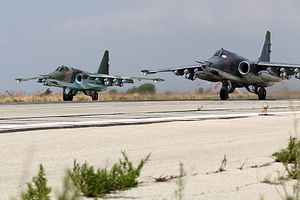The Syrian Kurds recently drastically improved their relationship with Russia since Turkey downed a Russian fighter jet in November last year. The Kurdish Democratic Union Party (PYD), the Syrian branch of the Kurdistan Workers Party (PKK), wants to use its relationship with Russia to prevent any Turkish plans to create a safe zone with the aim to prevent a Kurdish semi-autonomous region on Turkey’s border. At the same time, Russia is willing to work with Kurds to close off the Turkish border to anti-Assad insurgent groups.
Moreover, the United States has built good relations with the PYD and the so-called People’s Protection Units (YPG), the armed wing of the PYD, since the Islamic State (ISIS) besieged Kobani, a city situated immediately south of the border with Turkey in the Syrian province of Aleppo, and was defeated with the help of U.S.-led coalition airstrikes after four months of fighting. The United States now sees the YPG as one of the few allies left against ISIS, after U.S.-backed groups such as Division 30, Syria Revolutionaries’ Front (SRF) and the Hazm Movement were destroyed by Al Qaida’s Nusra faction. Next to Kobani, the United States also supported Kurdish operations in and around Hasakah, a pre-dominantly Kurdish city in the far northeastern corner of Syria.
Just like the PYD, the United States is not pushing for an immediate departure of the Assad government, but puts its main effort into first defeating Jihadist groups including Nusra and ISIS, whereas the priority for Syrian rebels is to defeat the Bashar al-Assad government. In the past, Syrian rebels and their backers in the Gulf and Turkey did not shrink from working with Jihadist groups to achieve the overthrow of Assad.
The main goal of the PYD is to create a federal Kurdish administration by capturing the Azaz-Jarabulus border strip along the Syrian-Turkish border (Azaz and Jarabulus are two Syrian cities located just south of the Syria-Turkish border) and thus connecting the Kurdish enclave of Efrin, a town and district in the province of Aleppo, with Kobani. Before 2014, this was still difficult due to the fact that the PYD areas were bordering mostly moderate anti-Assad rebel groups. After 2014, ISIS took over most of the rebel-held territories near Kobani and Hasakah. This made it easier for the United States to support the PYD due to the increasing threat that ISIS posed to Europe and the rest of the world, despite PYD’s links to the PKK, which is designated a terrorist organization by the U.S. and a number of other countries. With U.S. support, the YPG and PYD were able to finally connect the enclaves in Kobani and Hasakah by capturing the city of Tal Abyad, also located along the Syrian-Turkish border, in June 2015.
Now, the YPG aims to control the last remaining border strip between Azaz and Jarabulus. However, this border strip around Azaz and Marea in Aleppo’s countryside also includes Turkish-backed rebels that are fighting Assad, ISIS, and the YPG-led Syrian Democratic Forces (SDF) at the same time. The Turkish-backed rebels, however, have constantly failed to push back ISIS from the border strip, to the YPG’s advantage.
Turkey has tried to persuade the United States since 2012 to back a humanitarian corridor or safe zone. However, the U.S. administration rejected this until now. Due to Russian air power backing Assad, Syrian airspace is now sealed off from Turkish jets and Turkish troops. Turkey did not dare to intervene militarily after the PKK splinter group TAK attacked Ankara on 18 February, killing at least 28 people.
“You know who supports them. But we, as Turkey said previously, will not allow such a corridor. And we will do whatever we can,” the Turkish president Recep Tayyip Erdoğan said this week indirectly referring to Russia.
The United States backed the Turkish redline and told the YPG and SDF not to advance in the Jarabulus-Azaz border strip. The United States also tried to pressure the YPG to focus on Raqqah, the de-facto capital of ISIS. As a consequence, the United States is against the Syrian Kurds’ efforts to connect the Kurdish enclave of Efrin to Kobani through rebel-held and ISIS-held territory. Moreover, the United States doesn’t support a separate semi-autonomous zone for the Kurds.
However, unlike the United States that backs the territorial integrity of Syria, the Russian government is now backing a federal model. Russia is willing to support the Kurds to take the border strip of Azaz and Jarabulus, and Moscow offers the PYD more diplomatic backing to be included in the Geneva peace talks in order to marginalize any Turkish support for moderate rebel groups. Until now, Turkey was still able to exclude the PYD from Geneva.
As a result of Russian support, the YPG advanced last month, at the expense of Syrian rebel groups in Aleppo’s north, with Russian airstrikes, despite U.S. opposition. This gives the Kurds a bigger chance than ever of creating a contiguous, controlled territory along Turkey’s border.
Due to the increased Russian influence in Syria, it becomes difficult for the United States to give up support for the YPG, since it’s the only militia group that has effectively fought ISIS, while other rebel groups work together with Al Qaida’s Nusra front in Aleppo and Idlib. If the United States decides to end their support for the YPG in Hasakah or Kobani, it would deepen cooperation between PYD and Russia and further reduce Washington’s leverage in the conflict. Moreover, the United States would then also have very limited options to strike the ISIS capital of Raqqah with U.S.-backed ground forces.
Therefore, it is likely that both Russia and the United States will continue to support the YPG to fight anti-Assad rebel groups including the Islamic State.
Wladimir van Wilgenburg is an analyst of Kurdish politics for the Jamestown Foundation.

































